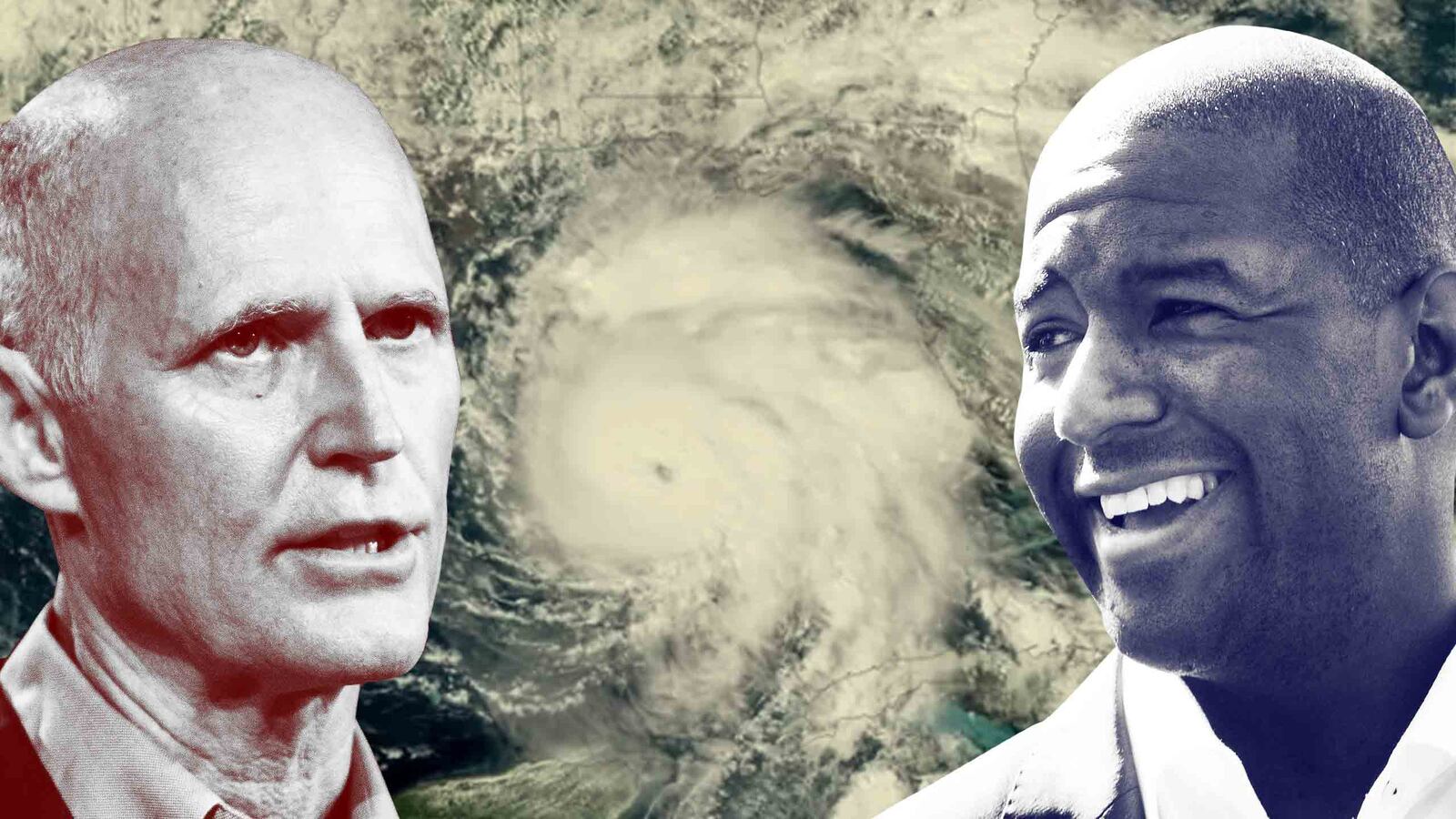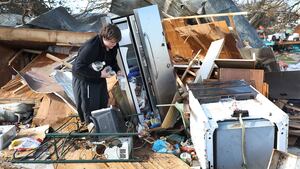Hurricane Michael’s devastation effectively created a political truce in Florida weeks before Election Day, a political ceasefire that could see a Republican governor and a Democratic mayor help each other win promotions come November.
In the devastating aftermath of the worst hurricane to hit Florida since 1992, Republican Gov. Rick Scott, who is running for U.S. Senate, and Democratic Tallahassee Mayor Andrew Gillum, who is running for governor, have had to pump the brakes on their partisan attacks—sometimes directed at each other—in the crucial final days of their campaigns.
More than that, the storm has forced the governor and the mayor to cooperate.
The hurricane knocked out electricity for thousands of residents in and around Tallahassee, the state capital where Scott resides as governor and where Gillum is the mayor. The two men have spoken at least four times in the past week, according to a source close to Gillum. Their truce comes as Gillum faces tough questions about whether he can set aside his political differences with Scott—and with the president, if he becomes governor—during the catastrophic aftermath of a major storm.
“They don’t want to be seen as not cooperating with the other. This is a time when collective action and rapid and effective action is what’s going to get each of these [candidates] beliefs among the voters that they’ve handled the crisis well,” Susan MacManus, a political science professor at the University of South Florida, told The Daily Beast. “If it doesn’t look like things are progressing fast enough, that could be a liability. … And if something does go wrong, it could quickly turn into an ad.”
Both campaigns privately acknowledge not only the benefits of sitting out from the campaign trail in the final days, but also the potentially devastating consequences at the ballot box if they are seen fumbling on a matter of life and death.
Gillum, who narrowly leads his Republican opponent, former Rep. Ron DeSantis, in the Florida gubernatorial race, has the opportunity to show that he can undertake the unique challenges that come with being Florida’s governor, such as hurricane relief. And Scott can use his own experience dealing with several hurricanes to his advantage in a similarly close race against incumbent Democratic Sen. Bill Nelson. And that’s exactly what Scott’s surrogates are doing, as the governor remains off the campaign trail.
“It’s clearly a political advantage for him to be a constant presence on state and national TV and to be on the ground, dealing with the hurricane hands on,” said a Florida Republican operative, who was granted anonymity to give a candid assessment of the politics of Hurricane Michael.
After Hurricane Hermine hit the state in 2016, Gillum faced accusations that Tallahassee turned down help from the state for political reasons. The mayor wrote a long Facebook post pushing back on those claims, but Scott’s office subsequently released a statement saying Gillum had turned down assistance from the Florida Department of Transportation to remove downed trees. Scott’s office would later say the press release was a “misunderstanding.” The online back-and-forth spilled over into a meeting between the officials the following day.
Yet now, the imagery of both men rising above partisan politics—should they be successful—is likely to help both of them at the expense of their opponents. Scott, in particular, could benefit the most as he is shown on television over the next few weeks in the run-up to Election Day, comforting storm victims and touring the most heavily damaged areas in the Panhandle.
Gillum’s supporters, too, are using the storm and its aftermath to argue that Gillum is ready to deal with these devastating weather events “on day one.”
“Mayor Gillum takes governing very seriously,” Sharon Lettman-Hicks, an adviser for the campaign who has known Gillum for more than 15 years, told The Daily Beast. “He’ll be ready on day one… This is not a game. This is not just politics as usual.”
Democratic operatives in Florida were not surprised that both candidates would functionally fulfill their duties, but they slammed DeSantis, whose campaign continued continued to air negative ads during the storm, drawing bipartisan condemnation. Lawyers for both Gillum and Scott have written letters urging stations to take down critical ads, including one from a Democratic super PAC that painted Scott as untrustworthy as the governor was telling residents to heed evacuation warnings.
A Democrat close to the campaign, granted anonymity to candidly assess the race, said DeSantis may have reaped more political benefits during the hurricane if he had not resigned his seat in the House of Representatives, where he could have aided the federal response and become a public face of the recovery.
The bipartisan politics surrounding Hurricane Michael are reminiscent of Superstorm Sandy in 2012, right before the presidential election. Then-New Jersey Gov. Chris Christie (R) caught heat from conservatives after he appeared alongside then-President Barack Obama, who traveled to the state just a few days before Election Day, and was even pictured hugging the Democratic president. That imagery, Republicans said at the time, likely hurt the GOP because it made Obama more likeable and helped to rally Americans around him in a time of national tragedy—a narrative the Obama campaign was happy to embrace. That dynamic also helped Christie, who cruised to re-election in 2013.
President Donald Trump is scheduled to arrive in northern Florida on Monday morning to tour the most heavily damaged areas. Scott is slated to met with the president, but Gillum was not expected to meet with him, according to a spokesman, mostly because the heaviest hurricane damage occurred west of Tallahassee.
Both Scott and Gillum are expected to remain focused on recovery efforts well after the president leaves. And if either candidate wins the office he is seeking, a significant portion of their tenures will be focused on recovery efforts, which are expected to last years.








